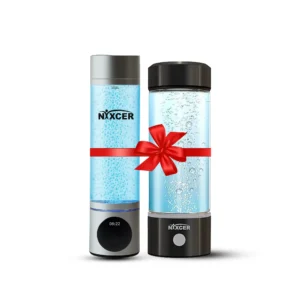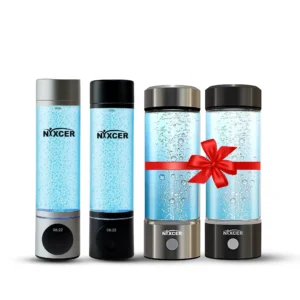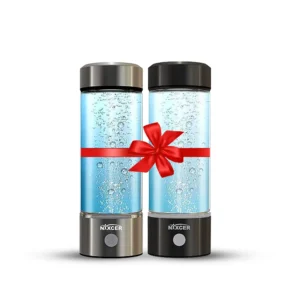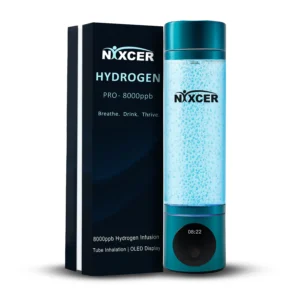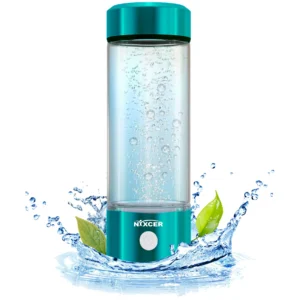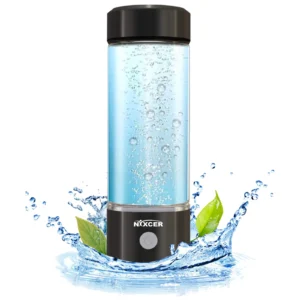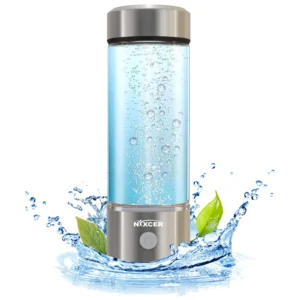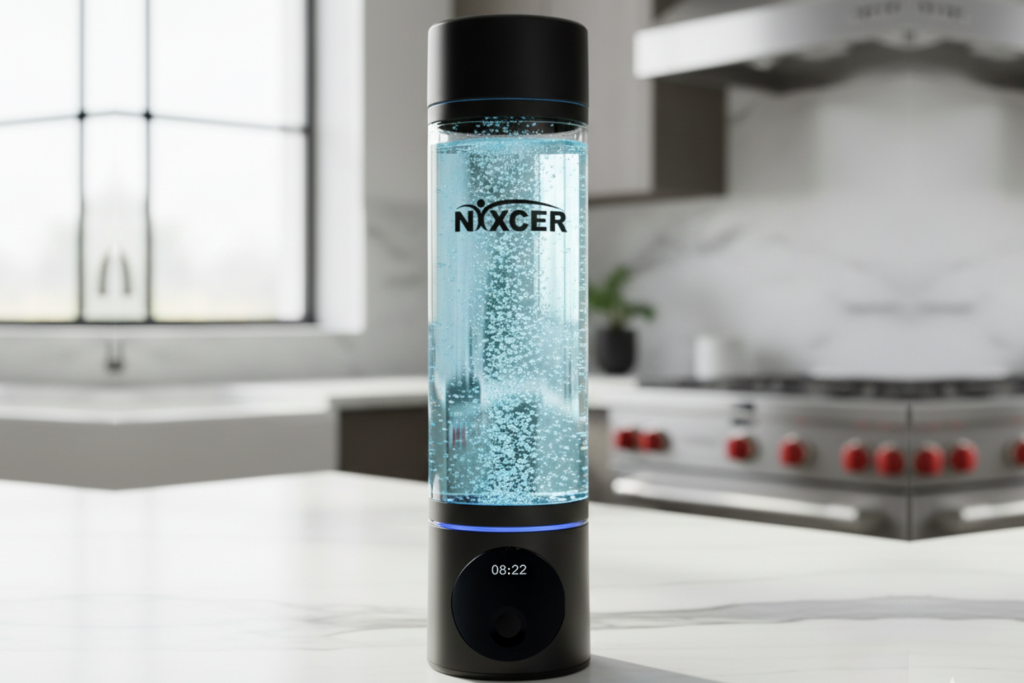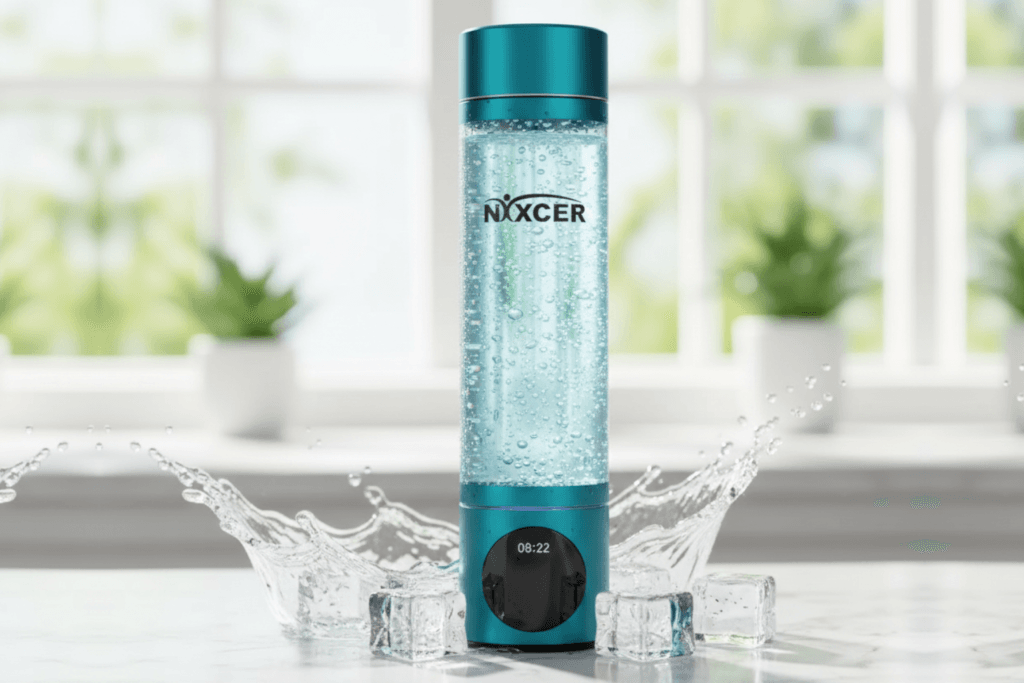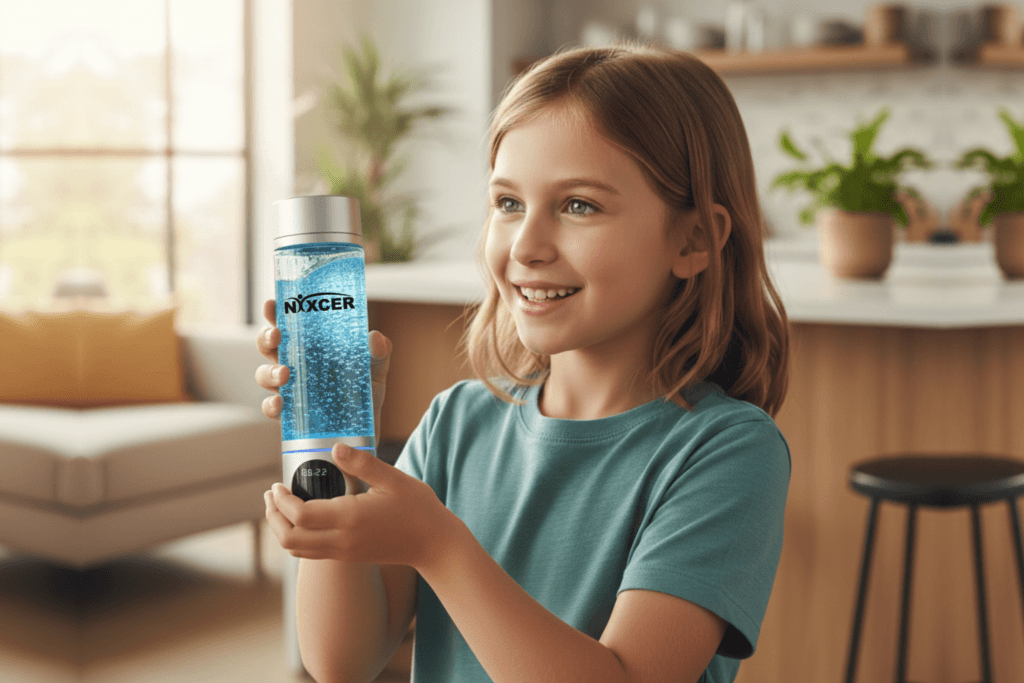As a pet owner, you want the best for your animals, including healthy food and frequent exercise. Have you thought about the water’s quality, though?
Many pet owners are wondering if hydrogen water is safe for their animals as it gains popularity for its health benefits. This guide comes from Nixcer, a reputable company that sells hydrogen water bottles. It discusses the safety and benefits of hydrogen-rich water for pets. It gives you the information you need to make a smart choice.
What is Hydrogen Water?
Hydrogen water is regular water infused with additional molecular hydrogen (H2) gas, creating a beverage with potential antioxidant properties. Hydrogen water is different from tap water. Tap water can have contaminants like chlorine.
People make hydrogen water by adding hydrogen gas to purified water. People often use electrolysis or devices that generate hydrogen, like those from Nixcer. This produces water that appears, smells, and tastes like normal water.
However, it might offer unique health advantages. It can reduce oxidative stress and combat free radicals.
Hydrogen water can help pets stay healthy. It may reduce inflammation and boost their energy levels. Let’s examine the safety and science of hydrogen-rich water for cats and dogs before replacing your pet’s water bowl.
Is Hydrogen Water Safe for Pets?
The short answer is that, when given correctly and sparingly, hydrogen water is generally safe for pets. Hydrogen-rich water can aid in the healing of wounds in dogs, according to studies like one that was published in Veterinary Medicine International. With minimal adverse effects, it accomplishes this by lowering oxidative damage and inflammation. To make sure it’s safe for your dog or cat, there are a few crucial things to think about.
Key Safety Considerations
1. Dosage and Concentration
Experts suggest starting with small amounts of hydrogen water. This is usually 1-2 ml for each pound of body weight each day.
The hydrogen concentration should be between 0.5 and 1.6 parts per million (ppm). Higher concentrations may cause mild side effects like increased urination or changes in water intake. Always introduce hydrogen water slowly. Start with a quarter of the recommended dose. Increase it over one to two weeks. Watch your pet’s behavior during this time.
2. Consult Your Veterinarian
Consult a veterinarian before giving your pet hydrogen water. This is crucial if your pet is taking medication or has other health concerns, such as kidney problems. You can consult a veterinarian to determine whether hydrogen water is safe for your pet. To keep your pet safe, they can also recommend blood tests or monitoring schedules.
3. Minimal Side Effects
Research indicates that hydrogen water has few side effects in most animals. Mild reactions are typically transient, such as brief variations in water intake. Consult your veterinarian and cease providing hydrogen water if you observe odd behavior, such as sluggishness or digestive problems.
4. Avoid Hydrogen Peroxide
Distinguishing between hydrogen water and hydrogen peroxide is critical. Veterinarians often use hydrogen peroxide to make pets vomit, but only under their care. It is unsafe for frequent use and can result in severe stomach burns. However, there are no such risks with hydrogen water, which is just water with hydrogen gas dissolved in it.
Potential Health Benefits of Hydrogen Water for Pets
Pet owners like hydrogen water because it has antioxidants. These can help fight free radicals and lower oxidative stress. Here are some potential health benefits for cats and dogs, backed by scientific research and user experiences:
1. Reduces Inflammatory Reactions
The anti-inflammatory properties of hydrogen water can help pets with joint problems, allergies, or arthritis. Hydrogen-rich water speeds up the healing of dog wounds, according to a Northeast Agricultural University study. It accomplishes this by encouraging blood vessel growth and lowering inflammation. As a result, wounds heal more quickly.
2. Fights Oxidative Damage
Reactive oxygen species and free radicals can harm cells, which accelerates ageing and causes long-term health problems. As a selective antioxidant, hydrogen water eliminates dangerous hydroxyl radicals without interfering with healthy reactive oxygen species. Pets’ skin, coats, and general vitality may all benefit from this.
3. Boosts Energy Levels
Hydrogen water has been reported by pet owners to increase energy levels, especially in older pets. Pets that drink hydrogen water may feel more playful and active. Dog owners have reported that their animals’ endurance improved while exercising.
4. Supports Hydration and Digestion
Pets with sensitive stomachs may benefit from hydrogen water’s improved hydration and nutrient absorption due to its smaller water molecule clusters. Better bowel movements, less bloating, and better digestion can result from this.
5. Enhances Immune System
Hydrogen water has anti-inflammatory and anti-oxidant properties. This could strengthen your pet’s defenses. It can support their long-term health and help them fend off illnesses. According to research on animals, it might help pets who have allergies or autoimmune diseases.
6. Improves Coat and Skin Health
After using hydrogen water, some pet owners have noticed that their dogs and cats’ coats are healthier and more glossy. These apparent benefits could be attributed to better hydration and decreased inflammation in the hair follicles.
How to Introduce Hydrogen Water to Your Pet’s Diet
For your pet’s comfort and safety, introducing hydrogen water into their daily routine needs to be done carefully and gradually. Here’s how to do it:
1. Start Small
Combine your pet’s normal water with a small amount of hydrogen water from a Nixcer bottle. Start, for instance, with a 1:3 mixture of tap water and hydrogen water. Increase this ratio gradually over the course of a week. This lets your pet get used to the new flavor and keep an eye out for any negative reactions.
2. Offer Choices
To find out which your pet prefers, place regular tap water and hydrogen water in different bowls. The noses of many pets are sensitive. Since hydrogen water doesn’t contain chlorine or other impurities like tap water does, they might naturally prefer it.
3. Use Pet-Safe Containers
To prevent chemicals from leaking from plastic, serve hydrogen water in bowls made of ceramic or stainless steel. Since hydrogen gas can dissipate over time, make sure the water is fresh.
4. Monitor Reactions
Maintain a record of your pet’s energy levels, water intake, and any behavioral or digestive changes. Reduce the dosage or speak with your veterinarian if you experience negative side effects.
5. Timing Matters
Hydrogen water should not be given during or right after meals as it may hinder the absorption of nutrients. Make sure it doesn’t interfere with any medications your pet may be taking and give it to them in between meals.
Special Considerations for Cats and Dogs
Cats
Cats react negatively to dietary changes. To prevent health issues, they must consume adequate water. These problems can include urinary tract infections and kidney disease.
Hydrogen water can be a good choice for cats. However, do not withhold food or water for long periods. Fasting can cause acute fatty liver. Make sure hydrogen water is a part of a taurine-rich, well-balanced diet and introduce it gradually to aid in detoxification.
Dogs
Dogs are able to adjust to hydrogen water quite well. Its antioxidant qualities can help them, especially older or active dogs. Hydrogen water may help lower inflammation and promote metabolic health in dogs with obesity or arthritis. However, without a veterinarian’s approval, don’t give it to dogs who have acid reflux or who are prone to vomiting due to hunger.
What Do Experts Say?
The safety of hydrogen water and its potential benefits for pets are supported by scientific and veterinary research. Dr. Jane Smith, a veterinarian researcher, says that hydrogen has antioxidant properties. These properties are especially helpful for older pets or those with long-term health issues.
Studies from Northeast Agricultural University show that hydrogen-rich water helps form blood vessels. It also boosts antioxidant genes. This helps wounds heal faster and lowers oxidative stress.
However, some experts caution that researchers need to conduct more studies to confirm long-term benefits and safety. Dr. Lisa is a veterinarian with 20 years of experience
She says that hydrogen water is not harmful. However, pet owners should focus on giving their pets filtered water. Talking to a vet before changing their pet’s water source is also important.
User Experiences with Hydrogen Water for Pets
Pet owners who have tried hydrogen water often share positive feedback. For example:
• Sarah, dog owner: Since we began using Nixcer’s hydrogen water bottle, my 12-year-old Labrador has more energy. He also seems less stiff.
• Tom, cat owner: My Persian cat’s coat feels softer. She drinks more water since we switched to hydrogen-infused water.
• Emily, cat owner: My cat was lethargic, but after two weeks of hydrogen water, she’s more active and eats better.
On the other hand, some pet owners, like Mike, report no noticeable changes and cite the cost as a concern. This highlights the importance of monitoring your pet’s response and weighing the benefits against your budget.
Choosing Quality Hydrogen Water for Your Pet
When selecting hydrogen water for your pet, consider the following:
• Hydrogen Content: Look for products with clear labeling of hydrogen concentration (0.5–1.6 ppm).
• Purity: Ensure the water is free from contaminants, as provided by Nixcer’s advanced hydrogen water bottles.
• Storage: Use sealed containers to maintain hydrogen levels, as the gas can escape over time.
• Certifications: Choose brands like Nixcer that provide testing and quality assurance for their hydrogen water products.
Nixcer’s hydrogen water bottles are made to give you high-quality hydrogen water. This makes it easy to keep your pet hydrated safely.
Cost and Availability
Ready-made hydrogen water can cost $1 to $3 per liter, which is more than tap water. But if you use a Nixcer hydrogen water bottle, you can make hydrogen-rich water at home, which will save you money in the long run. You can buy these devices online at Nixcer’s website, Amazon, or specialty pet stores. They cost between $26.99 and $99.99, depending on what they can do. Check local health food stores or your vet’s office for recommendations on where to purchase.
The Bottom Line
When given slowly and with the help of a veterinarian, hydrogen water is a safe and possibly good choice for cats and dogs. Its antioxidants may help lower inflammation, fight oxidative damage, raise energy levels, and improve overall health. But more research is needed to find out what its long-term effects are on pets.
You can give your pet clean, hydrogen-rich water that may improve their health by getting them a high-quality hydrogen water bottle from Nixcer. Before changing your pet’s diet, always talk to your vet first. Then, keep an eye on how they react to make sure they stay healthy.
Are you ready to give your pet the good things that hydrogen water can do? Visit Nixcer’s website to see their selection of hydrogen water bottles and start your pet’s journey to better hydration today!
-
$159.98 Original price was: $159.98.$89.99Current price is: $89.99.
-
$239.96 Original price was: $239.96.$169.99Current price is: $169.99.
-
$59.98 Original price was: $59.98.$49.99Current price is: $49.99.


